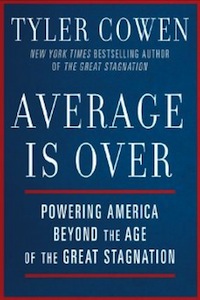-

Economist Tyler Cowen On The End Of Average
US inequality is hitting record highs again, we learned last week. Higher than Gatsby levels. The USA pins the needle for inequality globally. Higher than China. Higher than India. Americans have generally been unruffled by that, but then the 20th Century brought our greatest time of equality. In this century, says my guest economist Tyler Cowen, inequality will explode in the US. You’ll be rich or you’ll be Mexico-style poor. He’s OK with that. Nobel Prize-winning economist Joe Stiglitz is not. They’re both with us. Up next On Point: equality and inequality in America. Listen: Economist Tyler Cowen On The End Of Average
-

Who Will Prosper in the New World
This article originally appeared in The New York Times Self-driving vehicles threaten to send truck drivers to the unemployment office. Computer programs can now write journalistic accounts of sporting events and stock price movements. There are even computers that can grade essay exams with reasonable accuracy, which could revolutionize my own job, teaching. Increasingly, machines are providing not only the brawn but the brains, too, and that raises the question of where humans fit into this picture — who will prosper and who won’t in this new kind of machine economy? Who will do well? THE CONSCIENTIOUS Within five years we are likely to have the world’s best education, or close to it, online and free. But not everyone will sit down and go through the material without a professor pushing them to do the work. Those who are motivated to use online resources will do much, much better in the generations to come. It’s already the case that the best students from India are at the top in many Coursera classes, putting America’s arguably less motivated bright young people to shame. “Free” doesn’t really help you if you don’t make an effort. PEOPLE WHO LISTEN TO COMPUTERS Your smartphone will record data on your life and, when asked, will tell you what to do, drawing on data from your home or from your spouse and friends if need be. “You’ve thrown out that bread the last three times you’ve bought it, give it a pass” will be a text message of the future. How about “Now is not the time to start another argument with your wife”? The GPS is just the beginning of computer-guided instruction. Take your smartphone on a date, and it might vibrate in your pocket to indicate “Kiss her now.” If you hesitate for fear of being seen as pushy, it may write: “Who cares if you look bad? You are sampling optimally in the quest for a lifetime companion.”Those who won’t listen, or who rebel out of spite, will be missing out on glittering prizes. Those of us who listen, while often envied, may feel more like puppets with deflated pride. PEOPLE WITH A MARKETING TOUCH There will be a lot more wealth in this brave new world, but it won’t be very evenly distributed because a lot of human labor won’t seem like a special or scarce resource. Capturing the attention of customers… Read more…
-

Average is Over
Average is Over: Powering America Beyond the Age of the Great Stagnation is Tyler Cowen’s follow-up book to the hotly debated The Great Stagnation: How America Ate All the Low-Hanging Fruit of Modern History, Got Sick and Will Feel Better. Written in the midst of the global financial and fiscal crisis, The Great Stagnation, outlined the causes of the world wide economic slow-down. Average is Over is the users guide to living and prospering in the age of the Great Stagnation. Unsurprisingly, Cowen who also authored The Age of the Infovore: Succeeding in the Information Economy(2010) continues to see technology or machine intelligence as the driving force behind future economic growth and prosperity. He also warns that those nations and individuals who do not innovate and are not motivated to learn the new ways will be left behind. “I think for a lot of people, upward mobility will be much easier. We’re seeing an enormous amount of global upward mobility that’s quite rapid and quite sudden, and undiscovered individuals have a chance — using the Internet, using computers — to prove themselves very quickly. So I think the mobility story will be a quite complicated one. We’ll have a kind of new meritocracy, but again, it will be a meritocracy, which will be oppressive and perceived as oppressive in some ways due to more rapid measurement and this requirement that the person in some way really prove himself or herself.” Tyler Cowen on Average is Over NPR Morning Edition
-

Tyler Cowen on The Great Stagnation
-

Tyler Cowen on The Great Stagnation
-

On the Horizon, Five Reasons to Smile
-

U.S. has run out of ‘low-hanging fruit’ and needs the next generation of innovation
-

Can We Ever Do Better Than the Toilet?
-

What If America’s Best Ideas Were Behind It?
-

Technology Is the Way Out of Economic Doldrums